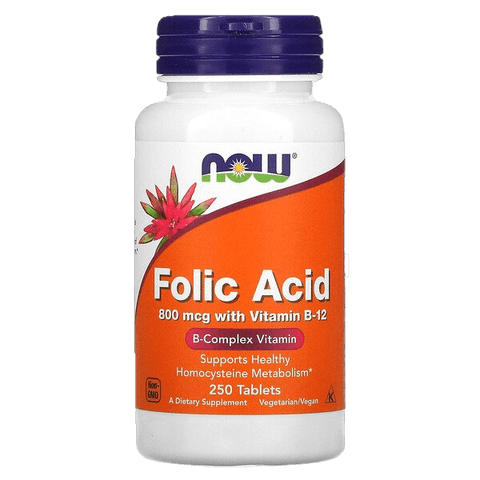Sale
Folic Acid 800mcg 250 tabs - Agora Alimentos
€11,89 EUR
€13,95
Unit price
/
Unavailable
Folic Acid 800mcg 250 tabs - Agora Alimentos is backordered and will ship as soon as it is back in stock.
Description
Description
Now's Folic Acid 800mcg is a special formula for pregnant or breastfeeding women.
Now's Folic Acid 800mcg is folic acid with vitamin B12. It maintains adequate homocysteine levels (low levels caused by vitamin B12 deficiency). It prevents spina bifida, reduces the risk of premature births, and reduces the risk of neural tube defects. With vitamin B12, it helps maintain adequate homocysteine levels. Vegetarian formula.
Folate deficiency is one of the most common vitamin deficiencies.
It can be the result of inadequate intake, poor absorption, abnormal metabolism, or increased needs. Common symptoms of folate deficiency are fatigue and loss of energy, which can lead to anemia. Deficiency during pregnancy can result in premature birth and/or fetal malformations. In children, growth may be stunted and puberty may be delayed. Folate deficiency has also been linked to neurological problems such as dementia and depression. Folate deficiency is common in many parts of the world and is part of the overall problem of malnutrition. In developed countries, folate deficiency is primarily found in economically disadvantaged groups.
Reduced folate intake is also common in people on specific diets, such as those seeking weight loss. Stomach and large intestine problems can also lead to folate deficiency due to malabsorption. Diseases involving high cell turnover (e.g., cancer, certain anemias, skin conditions) increase folate requirements. This also occurs during pregnancy and breastfeeding, due to rapid tissue growth during pregnancy and milk loss during breastfeeding. Women who take folic acid supplements for at least a year before becoming pregnant can reduce the risk of premature birth.
This is the conclusion of a North American study involving 35,000 pregnant women. Folic acid is often recommended for pregnant women, as it is known as a powerful ally in preventing many brain and spinal deformities, particularly spina bifida. But this study found another benefit: it reduces the risk of premature birth in 70 percent of cases if taken a year before becoming pregnant. Although premature babies survive, being born prematurely carries the risk of complications related to the lungs, vision, and brain, among others.
"We have a very exciting potential method for preventing premature births, not only because it's very easy to implement, but also because it has a powerful effect," (Radek Bukowski, leader of the study conducted at the University of Texas Medical Branch.) Plasma homocysteine levels are determined by diet and genetic predisposition. In the case of diet, high levels of folic acid and B vitamins help metabolize and reduce homocysteine levels. Low blood folic acid levels are closely linked to a higher risk of cardiovascular disease.
Now's Folic Acid 800mcg is a special formula for pregnant or breastfeeding women.
Now's Folic Acid 800mcg is folic acid with vitamin B12. It maintains adequate homocysteine levels (low levels caused by vitamin B12 deficiency). It prevents spina bifida, reduces the risk of premature births, and reduces the risk of neural tube defects. With vitamin B12, it helps maintain adequate homocysteine levels. Vegetarian formula.
Folate deficiency is one of the most common vitamin deficiencies.
It can be the result of inadequate intake, poor absorption, abnormal metabolism, or increased needs. Common symptoms of folate deficiency are fatigue and loss of energy, which can lead to anemia. Deficiency during pregnancy can result in premature birth and/or fetal malformations. In children, growth may be stunted and puberty may be delayed. Folate deficiency has also been linked to neurological problems such as dementia and depression. Folate deficiency is common in many parts of the world and is part of the overall problem of malnutrition. In developed countries, folate deficiency is primarily found in economically disadvantaged groups.
Reduced folate intake is also common in people on specific diets, such as those seeking weight loss. Stomach and large intestine problems can also lead to folate deficiency due to malabsorption. Diseases involving high cell turnover (e.g., cancer, certain anemias, skin conditions) increase folate requirements. This also occurs during pregnancy and breastfeeding, due to rapid tissue growth during pregnancy and milk loss during breastfeeding. Women who take folic acid supplements for at least a year before becoming pregnant can reduce the risk of premature birth.
This is the conclusion of a North American study involving 35,000 pregnant women. Folic acid is often recommended for pregnant women, as it is known as a powerful ally in preventing many brain and spinal deformities, particularly spina bifida. But this study found another benefit: it reduces the risk of premature birth in 70 percent of cases if taken a year before becoming pregnant. Although premature babies survive, being born prematurely carries the risk of complications related to the lungs, vision, and brain, among others.
"We have a very exciting potential method for preventing premature births, not only because it's very easy to implement, but also because it has a powerful effect," (Radek Bukowski, leader of the study conducted at the University of Texas Medical Branch.) Plasma homocysteine levels are determined by diet and genetic predisposition. In the case of diet, high levels of folic acid and B vitamins help metabolize and reduce homocysteine levels. Low blood folic acid levels are closely linked to a higher risk of cardiovascular disease.
250 tablets



